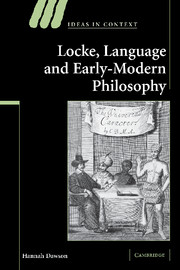Book contents
- Frontmatter
- Contents
- Acknowledgements
- Notes on the text
- Introduction
- PART I LANGUAGE IN THE TRIVIUM
- PART II PHILOSOPHICAL DEVELOPMENTS OF THE PROBLEM OF LANGUAGE
- PART III LOCKE ON LANGUAGE
- 7 Words signify ideas alone
- 8 Semantic instability: an inherent imperfection
- 9 A life of their own
- 10 Locke in the face of language
- Bibliography
- Index
- IDEAS IN CONTEXT
9 - A life of their own
Published online by Cambridge University Press: 22 September 2009
- Frontmatter
- Contents
- Acknowledgements
- Notes on the text
- Introduction
- PART I LANGUAGE IN THE TRIVIUM
- PART II PHILOSOPHICAL DEVELOPMENTS OF THE PROBLEM OF LANGUAGE
- PART III LOCKE ON LANGUAGE
- 7 Words signify ideas alone
- 8 Semantic instability: an inherent imperfection
- 9 A life of their own
- 10 Locke in the face of language
- Bibliography
- Index
- IDEAS IN CONTEXT
Summary
Locke's profound deconstruction of the signification of words, prosecuted by both his arguments and his self-reflexive example, is designed to make his readers humble, cautious and careful speakers. Having seen words crumple under the searing glare of his inquiry and having wound along its circuitous route, so that we could not but get his meaning, we are supposed to reflect continually on the superficial and manufactured nature of the meanings of words and on the likelihood that we talk at cross purposes. Having realised the limits of our linguistic horizon, we can move forward with language toward knowledge and communication, realistically and properly using what is indeed a wonderful God-given instrument. However, Locke is pessimistic of us resetting our sights. This is partly because we are lazy, proud and deluded, but also because language itself positively encourages the kind of problematic speech against which we have seen him rail. Language allows us to corrupt ourselves; it promotes vanity and introversion, not only in speech but even in thought. We might arrogantly assume impossible knowledge and proffer deaf ears to our fellow men, but it is the nature of words that enables, if not causes us to hold forth and cogitate in an overambitious and self-centred way. It enables us to mouth sounds without signification. Locke spells out a man's predicament: words are ‘external sensible signs, whereby those invisible ideas which his thoughts are made up of, might be made known to others’.
- Type
- Chapter
- Information
- Locke, Language and Early-Modern Philosophy , pp. 239 - 276Publisher: Cambridge University PressPrint publication year: 2007



